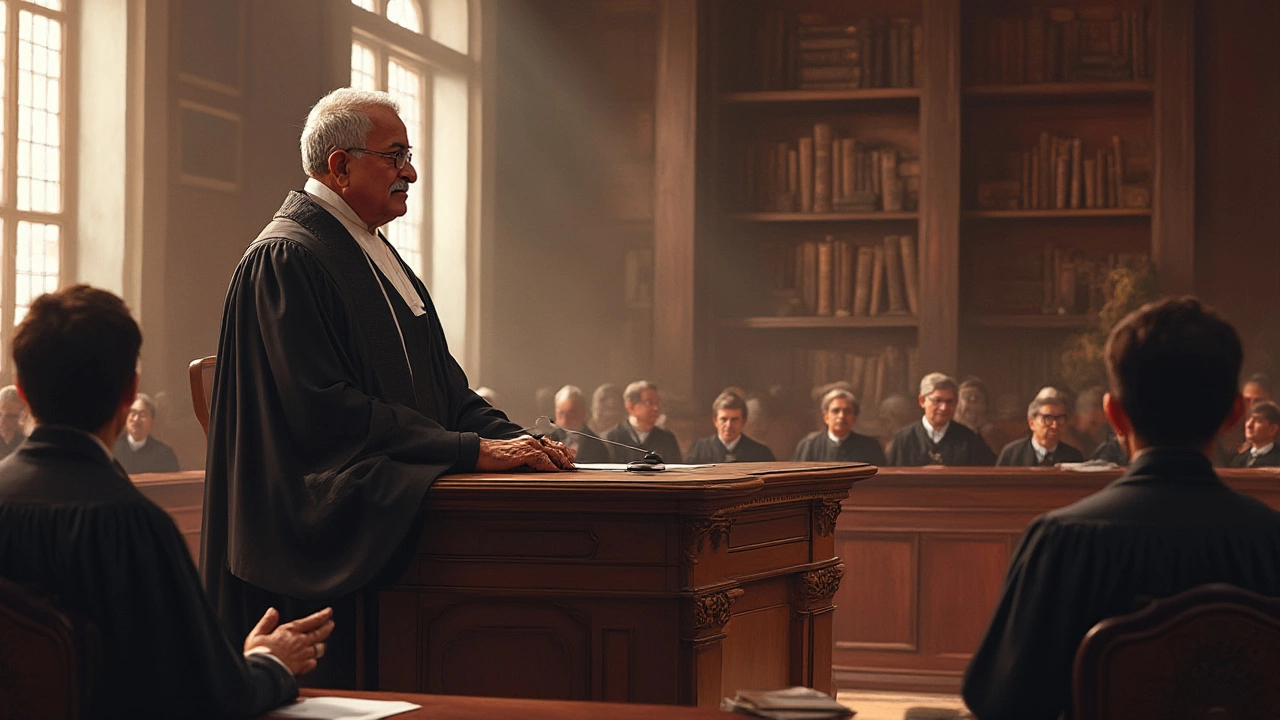Picture this: you’ve studied for years, taken on sleepless nights, and survived ten rounds with the law school exam schedule. You finally become a lawyer. But what’s waiting at the very top of the legal mountain? Can you be the boss of all bosses—and what does that even look like for a lawyer? The cloak-and-dagger world of legal hierarchy is full of prestige, unspoken rules, larger-than-life personalities, and—let’s be real—a ton of tiny print. If you’re curious about what job title truly wipes the floor with the rest in law, you’re not alone. I wondered the same thing while chasing Willow (my sheepdog) across Kelburn, with a court case replaying in the back of my head. Turns out, there are a couple ways to look at the “highest position,” whether you’re thinking about bigwig law firms or the grand high towers of the court system. Let’s unpack where real power, decision-making, and respect peak for lawyers—right here in New Zealand and around the world.
How Law Firm Hierarchies Really Work
Step into any law firm and you’ll find an unofficial social ladder. At the bottom, you have your interns and law clerks—bright-eyed and still figuring out which end of the legal document gets signed. Next come the junior lawyers or associates, grinding out hours, churning through briefs, and hoping to one day stand where the big shots do. Mid-level and senior associates soon follow; these folks know the firms’ favourite local cafes as well as they know court rules. Then, somewhere in the middle, float the senior solicitors, sometimes called special counsel or senior associates. They might’ve worked up a loyal client base or maybe they’ve got a specialty, like environmental law or mergers and acquisitions.
Making it to the next rung? That’s where “partner” comes in. Law firms, especially larger ones, often split partners into tiers. Some are junior partners (sometimes called salaried partners) and some are equity partners. The idea is simple: as an equity partner, you literally own a chunk of the firm. Think of it like rugby—if you’re a junior associate, you’re still learning how to pass the ball. As a partner, you’re calling moves and deciding roster spots. Equity partners share in profits, steer firm direction, have a big say in new hires, and often manage the team spirit (or drama) that comes with a competitive office. Highest position in a lawyer? In law firms, that’s the “Managing Partner” or “Senior Partner” at the very top.
The Managing Partner isn’t just a figurehead; they’re the CEO, choosing which legal sectors to invest in, approving budgets, and acting as the public face of the firm. In major New Zealand firms like Chapman Tripp or Bell Gully, the Managing Partner’s decisions ripple into legal circles, affecting government, public opinion, and the firm’s place in major deals or big court battles. Here’s a fun fact: Chapman Tripp, one of New Zealand’s oldest firms, rotates partners as the “Chair” every few years—a sweet way to keep things fresh but still keep the club exclusive. The biggest international firms—think Allen & Overy or Clifford Chance out of London—have global managing partners or “senior partners” heading up offices across continents. These lawyers aren’t just juggling legal issues; they’re tracking economic trends in Asia, regulatory changes in Europe, and what’s happening with AI in New Zealand courts. It takes more than a sharp mind—you need leadership, people skills, business savvy, and nerves of steel.
Law firm hierarchies might seem clear, but what about in-house legal departments? Here, the peak is usually the “General Counsel” or “Chief Legal Officer.” They’re the lead lawyer for a company, handling internal legal matters, discussing strategy with the CEO, and sometimes testifying before Parliament or regulatory boards. The General Counsel’s role is growing—research suggests more than 70% of large companies now give extensive business, ethical, and risk advice straight up in the executive meetings. If you’re into leadership and want to avoid firm politics, General Counsel is where high legal power lives inside corporations.
A quick snapshot of the hierarchy in law firms, just to make it stick:
| Level | Position Title | Typical Duties |
|---|---|---|
| 1 | Intern/Law Clerk | Research, draft basic docs, support |
| 2 | Junior Lawyer/Associate | Basic legal tasks, client work |
| 3 | Senior Associate/Special Counsel | Complex cases, mentor juniors |
| 4 | Partner (Junior/Salaried) | Manage cases, win new business |
| 5 | Equity Partner | Profit-sharing, firm management |
| 6 | Managing/Senior Partner | Lead firm-wide decisions, public face |
Clever tip: If you’re chasing partnership, start by building a strong client base early, show you can bring in new business, and always keep an eye out for chances to speak at industry events. Law is as much about building trust as it is about winning arguments.

Biggest Legal Roles Outside Law Firms: Judges and Chief Counsel
Now, if you’re not into running billable hours or playing corporate politics, you might be looking at the highest role outside a law firm. Enter the judiciary. Becoming a judge is considered the crown jewel of a legal career for good reason—judgment, independence, and public trust are everything. In New Zealand, judges don’t run for election like in parts of the US. Instead, they’re appointed (after years, sometimes decades, of exceptional lawyering). For most lawyers, being offered a judgeship is a sign they’ve made it—recognized for wisdom, authority, and the ability to stay impartial even when the stakes are high.
Within the judiciary, things don’t stop at “Judge.” There are levels: District Court Judges focus on everyday criminal, family, and civil matters—critical, but not usually making national headlines. Above them are High Court Judges, dealing with serious criminal cases, big money civil suits, and important constitutional questions. Then comes the Court of Appeal—where legal errors and serious debates from the High Court go for review. Finally, at the very summit sits the Supreme Court of New Zealand, with the Chief Justice at its head. The Chief Justice isn’t just the most senior judge—they’re a bit like the captain of a country’s legal system. They oversee how justice is done, run the show in major legal reforms, and sometimes represent New Zealand in international legal matters. Dame Helen Winkelmann holds this role right now, making headlines on issues like criminal justice reform and the place of tikanga Māori in law. Fun fact: the role of Chief Justice is so respected here that they even administer the prime minister’s oath.
And for lawyers who want the gravitas of government without wearing a robe? There’s the “Solicitor-General.” In New Zealand, the Solicitor-General is the lead government lawyer for the Crown in court. They argue cases in the Supreme Court, advise on constitutional law, and lead a team that helps set policy on everything from Treaty of Waitangi settlements to tech privacy laws. The Solicitor-General answers to the Attorney-General, who is usually an elected MP and often an actual Cabinet Minister, but isn’t always a career lawyer. It’s a unique setup—the Solicitor-General wields hefty legal influence, steering not only cases, but sometimes the country’s direction on important questions.
Let’s not forget unique public or global positions. Consider the United Nations’ International Court of Justice judges, who decide disputes between countries—this is the rare air for lawyers from any nation and a place where international law is made on a grand scale.
| Judiciary Level | New Zealand Example | Scope of Authority |
|---|---|---|
| District Court Judge | Judge John Smith (fictional) | Criminal, family, civil (lower value) |
| High Court Judge | Justice Francis Cooke | Serious criminal, major civil, constitutional |
| Court of Appeal Judge | Justice Ellen France | Appeal key decisions, clarify law |
| Supreme Court Judge/Chief Justice | Dame Helen Winkelmann | Final legal arbitrator, court reforms, national rep |
- Tip: Becoming a Chief Justice or Solicitor-General takes unshakable legal skill, a history of fairness, and, often, decades of public service. Start networking early and look for complex case experience—diversity and standing out matter in appointments.
Judicial and top government legal roles rank high for impact and legacy, not just salary. Judges set standards that ripple out to millions. Solicitor-Generals and Chief Justices sign off on decisions that end up in textbooks—and sometimes in pub debates. There’s no room for shortcuts; these are careers built on decades of solid, community-trusted work.

Pathways, Challenges, and Tips to Reach the Highest Legal Ranks
If you’re staring down your own legal career and wondering whether to go firm, government, or the bench, you’re not alone. The climb is different depending on where you start and what drives you—income, influence, a sense of justice, or a love of being in the public spotlight. Most top partners at New Zealand firms start out like everyone else: earning their stripes on tough files, growing clients, improving their courtroom style, and building authority in a chosen specialty. Networking is everything. Want to be a partner or even managing partner? You’ll need to show not only legal expertise but also the kind of trustworthiness where colleagues are happy to stake their own reputations on you. Business development—bringing new clients to the table—often weighs as much as technical skill when making promotions.
For future judges or government legal heavyweights, reputation is the currency. Senior barristers, especially those who’ve achieved the status of “Queen’s Counsel” (now “King’s Counsel” with the new king), are regularly tapped for judicial roles. If you want to wield gavel power, you need a record clean as a whistle, public service experience, plenty of high-profile advocacy, and a knack for making tough, fair decisions with a straight face. Clerking for a respected judge early on also opens big doors—you’ll see how judgments are decided and build insider connections.
The numbers are stacked: New Zealand’s Law Society reports more than 15,000 lawyers nationwide, but only a few hundred ever achieve partner status, and far fewer make it to High Court Judge or higher. Of the top 10 law firms by size in Aotearoa, the average time to become a partner is around 10 to 15 years from graduation—if you’re lucky. Female and Māori lawyers have more opportunities than before, but challenges remain, and big firms are scrambling to modernize performance metrics and work-life balance thanks to growing complaints from young lawyers (and a few viral LinkedIn rants).
Curious about salary? Equity partners in top firms can earn anywhere from $300,000 to $1,200,000+ NZD a year, depending on the year’s profits and their personal billing. By contrast, a High Court Judge earns a set salary around $400,000 NZD, but many say the impact and prestige matter more than the cash. The Chief Justice and Solicitor-General earn a bit more for the load they carry, but these roles are about legacy rather than just financial gain. As of 2025, Dame Helen Winkelmann has been on panels discussing everything from family court transparency to AI’s place in criminal sentencing—a Chief Justice’s day rarely looks the same twice.
So what’s the ultimate tip for climbing to the top legal role? Resilience and visibility matter as much as grades. Get involved in legal societies, speak up at professional events, write for legal journals, teach, or take on pro-bono cases that matter to you. Reputation is earned, not gifted. If you’re after the glamour, remember most senior lawyers spend as much time on admin, client relationships, and mentoring as they do arguing in court. The best leaders I’ve met keep their ego in check, mentor young lawyers, and stay curious—getting Willow to listen off-lead is sometimes less challenging than keeping a team of competitive lawyers motivated.
- Explore multiple legal avenues. Don’t put yourself in a single box too soon—today’s partners started in everything from family law to cyber crime.
- Stay authentic. Clients and colleagues can read insincerity a mile away.
- Invest in your networks. From alumni drinks to regional bar association BBQs, connections drive the legal world.
- Check out judicial appointments and law firm leadership trends on official sites—they publish who’s rising, who’s moving, and what skills are valued (it’s more transparent than you think).
- Balance ambition with ethics and people skills. Those who last are remembered for good judgment and fair leadership, not just sharp arguments.
Reaching the top takes grit, smarts, and a bit of luck. Whether your sights are set on the boardroom or the bench, remember—the law always needs people with backbone and a touch of humanity. Maybe that’s what really counts most.
